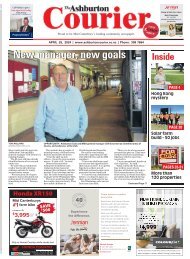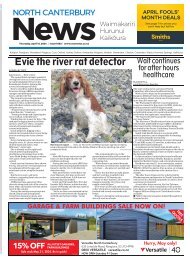Nor'West News: July 19, 2016
You also want an ePaper? Increase the reach of your titles
YUMPU automatically turns print PDFs into web optimized ePapers that Google loves.
10 essential computer skills for the workplace<br />
Computer tutor Josh Hough, who<br />
teaches school students through<br />
Ara Institute of Canterbury, offers<br />
some useful tips about basic<br />
computing for employment.<br />
1. Knowing how to use a computer<br />
Knowing how to actually operate a computer<br />
will make you a much more efficient<br />
employee. Having an understanding of the<br />
appearance, keyboard commands and ways<br />
in which the computer operating system<br />
works will make you more valuable to<br />
your employer.<br />
2. Word processing skills<br />
4. Using email<br />
Many workplaces now use email as their<br />
primary method of communication.<br />
Having a good understanding of how to<br />
use it is essential. Knowing about correct<br />
email etiquette is also important as it’s<br />
easy to convey the wrong message when<br />
communicating in text only.<br />
5. Using Microsoft Office<br />
Many employers use specialist software,<br />
however the majority use Microsoft office<br />
for common tasks such as word processing,<br />
spreadsheets, databases and presentations.<br />
Being familiar with these programmes is an<br />
essential skill to possess.<br />
employer safe when using the computer<br />
is something every employee should know.<br />
8. Knowing how to back up your work<br />
Unfortunately, computers can get viruses and<br />
networks can crash. Learning how to back up<br />
your documents so you don’t risk losing all of<br />
your hard work if something goes wrong is a<br />
really helpful skill to possess.<br />
9. Organising your files<br />
A large amount of businesses store their files on<br />
computer networks that can vary in complexity.<br />
Being able to organise your files effectively is a<br />
desirable skill for many employers.<br />
10. Understanding basic<br />
hardware terminology<br />
You don’t have to be a tech-wiz, but you<br />
do need to understand the difference<br />
between the various parts of the computer<br />
like the “hard drive”, “modem” and “router”.<br />
Knowing the names of the parts and their<br />
functions will make it much easier to get<br />
help when you need to report a problem<br />
to tech support.<br />
Word processing is an absolutely essential<br />
skill in today’s job market. Many employers<br />
require their staff to be able to proficiently<br />
write, edit, and produce a variety of<br />
documents using a computer.<br />
3. Using the internet<br />
Being able to confidently use the internet<br />
is crucial for job seekers. Having the ability<br />
to complete research by browsing various<br />
websites or by using search engines can<br />
allow you to easily find things out – useful for<br />
both work and home life!<br />
6. Using the cloud<br />
Cloud technology provides online storage<br />
space and is commonly used to store, send<br />
and receive files. Many businesses make use<br />
of this technology to allow their employees<br />
to share and collaborate on files and<br />
documents.<br />
7. Keeping secure<br />
There are all sorts of security risks<br />
associated with using a computer, especially<br />
when sensitive data is involved. Knowing the<br />
dos and don’ts to help keep you and your<br />
Opening doors to the world of ICT<br />
Ara Computing For Free programmes<br />
don’t just lead to wider immediate work<br />
opportunities - they can open up a whole<br />
world of computing programmes to help<br />
you go even further. Many students discover<br />
a passion and an aptitude for computing<br />
through Computing For Free. Having boosted<br />
their confidence and study skills, they then<br />
decide to take their knowledge further.<br />
There are a wide range of pathways available<br />
for studying computing at Ara depending<br />
on the career outcomes you want to achieve<br />
and how long you want to study for. All<br />
programmes are developed in conjunction<br />
with industry to provide the most up-to-date<br />
and relevant knowledge of this fast-paced<br />
and exciting industry.<br />
The entry point for the Department of<br />
Computing programmes is the New Zealand<br />
Certificate in Information Technology<br />
Essentials Level 4. This six month, full time<br />
programme offers an excellent overview of<br />
major computing areas including hardware,<br />
operating systems, networking and security,<br />
user experience, website design and<br />
development, information systems, and<br />
software design and development. It also<br />
covers the professional, ethical and legal<br />
context of computing in the real world.<br />
Many students<br />
discover a passion<br />
and an aptitude for<br />
computing through<br />
Computing For Free.<br />
There are a number of 12 month New Zealand<br />
diplomas covering IT technical support or<br />
web development and design at level 5,<br />
and networking or systems administration<br />
at level 6. These can lead right through to<br />
the three year Bachelor of Information and<br />
Communication Technologies.<br />
Youth who want to leave school and get<br />
started on their career can enrol in the<br />
Certificate in Foundation Studies Level 2<br />
(Computing) through the Youth Guarantee<br />
programme at Ara, which is fees-free.<br />
At the other end of the spectrum,<br />
professionals in the industry can put<br />
their expertise towards academic<br />
credits and a qualification through<br />
the Centre for Assessment of Prior<br />
Learning. This is an excellent<br />
way to upskill and achieve<br />
career progression.<br />
For all the details,<br />
see www.ara.ac.nz.<br />
ara.ac.nz |


















